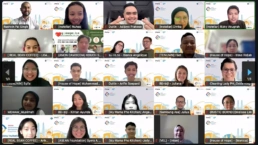The ASEAN Social Enterprise Development Programme 4.0 (ASEAN SEDP 4.0) officially commenced with a virtual onboarding session on 21 May 2025, welcoming 30 promising social enterprises across the region. These participants were selected from a competitive pool of 371 applicants.
Syera A. Buntara, ASEAN SEDP Project Coordinator, opened the session by expressing expectations for the selected enterprises. “We hope that the 30 social enterprises in this cohort can access the necessary resources and scale their impact. This programme is specifically customised to meet your needs,” she remarked in her opening address.
Following the onboarding, participants engaged in their first training module, titled “System Change Buildings Workshop”, led by Adisti Chandra, Chief Operating Officer of Instellar Impact. The session introduced participants to the “Zebra Mindset”, a philosophy that presents an alternative to the high-risk, growth-at-all-costs culture often associated with unicorn start-ups.
“Why embrace the zebra, not the unicorn?” Adisti raised this question to the audience. Zebras have black and white stripes, symbolising the harmony of purpose and profit. They live in herds and thrive through collaboration,” she explained.
Adisti explained that while unicorns typically rely on massive injections of venture capital, aiming for exponential, short-term growth and eventual exits, zebras prioritise steady, sustainable growth with a long-term vision of profitability and positive social impact. She highlighted the imbalance often found in unicorn teams, where engineers dominate, contrasting it with the more holistic team structures of zebra enterprises, which emphasise community engagement and customer success.
“The endgame for zebras is sustainable prosperity. You don’t need to chase hockey-stick growth or billion-dollar valuations. Instead, you can explore more traditional and grounded funding models,” she said.
The session set a reflective tone for the cohort, encouraging participants to embrace models that align with their values, resources, and long-term goals, laying a strong foundation for the upcoming phases of the ASEAN SEDP 4.0 programme.
Scaling with Purpose: Rethinking Growth for Social Enterprises
The ASEAN SEDP 4.0 continued its virtual training series with the second session led by Rashvin Pal Singh, Group CEO of Biji-Biji Initiative and Mereka, last 5 June 2025. In this session, Rashvin challenged participants to redefine the concept of scaling for social enterprises, shifting from conventional start-up ideals to a more resilient, purpose-driven approach.
“Social enterprises often feel pressured to grow rapidly, imitating the venture capital-fuelled trajectory of traditional start-ups, scaling fast, raising large funds, and chasing exponential growth,” Rashvin explained. “But sustainable impact requires us to rethink what scaling truly means.”
Introducing the concept of Resilient Scaling, Rashvin encouraged participants to begin with endgame thinking, which is a process of clarifying the ultimate purpose of their organisations. “What are we really building towards? What does success look like, even beyond our involvement? What metrics truly reflect progress towards our mission?” he explained.
As an example, he noted that many social enterprises in Australia pursue government adoption as their endgame, where solutions that have proven effective in addressing social
challenges are eventually integrated into government systems, signifying both validation and scalability of impact.
Another pillar of resilient scaling, Rashvin noted, is ecosystem partnership. He encouraged participants to conduct ecosystem mapping and identify key stakeholders in their environments using the Penta-Helix model. This model outlines five essential sectors that shape the development of social enterprises: government (political power), academia (knowledge power), community (social power), business (capital power), and media (information dissemination power).
“Partnership is not just about asking for support,” Rashvin emphasised. “It’s about exchanging value. It begins by understanding what we can offer to others.”
Then he went on to describe seven types of impactful partnerships that social enterprises can explore: first, strategic partnerships, joint ventures to achieve shared goals; Cross-selling and distribution partnerships, expanding reach through complementary offerings; Capacity-building partnerships, sharing skills, mentorship, and technical knowledge; Collective impact initiatives, multi-stakeholder collaborations to tackle complex social issues; Co-branding or campaign partnerships, amplifying visibility through joint efforts; Advocacy and policy collaborations, influencing systemic change through alliances; Revenue-sharing partnerships, shared income models that benefit both parties.
During the session, Adijoyo Prakoso from Duitin, a social enterprise in the recycling sector, shared the challenges his team faces in valuing social capital. “It’s often easier to align with corporate partners than to generate shared value with community stakeholders,” he noted. “Yet, in our field, community connection is everything.”
Responding to this, Rashvin acknowledged the reality of such challenges.
“Capital goes beyond finances. Social capital is often underutilised, yet it’s crucial for long-term sustainability,” he said.
To close the session, Rashvin left participants with key takeaways: “Focus on the bird in your hand. Build partnerships based on what you can offer. Define your endgame early. And remember, there are many untapped opportunities for meaningful collaboration.” This session reaffirmed that for social enterprises, scaling is not just about growing fast, but growing right, with intention, purpose, and resilience.


